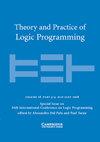A Survey of the Proof-Theoretic Foundations of Logic Programming
IF 1.1
2区 数学
Q3 COMPUTER SCIENCE, SOFTWARE ENGINEERING
引用次数: 1
Abstract
Several formal systems, such as resolution and minimal model semantics, provide a framework for logic programming. In this article, we will survey the use of structural proof theory as an alternative foundation. Researchers have been using this foundation for the past 35 years to elevate logic programming from its roots in first-order classical logic into higher-order versions of intuitionistic and linear logic. These more expressive logic programming languages allow for capturing stateful computations and rich forms of abstractions, including higher-order programming, modularity, and abstract data types. Term-level bindings are another kind of abstraction, and these are given an elegant and direct treatment within both proof theory and these extended logic programming languages. Logic programming has also inspired new results in proof theory, such as those involving polarity and focused proofs. These recent results provide a high-level means for presenting the differences between forward-chaining and backward-chaining style inferences. Anchoring logic programming in proof theory has also helped identify its connections and differences with functional programming, deductive databases, and model checking.逻辑规划的证明理论基础综述
一些形式化的系统,如分辨率和最小模型语义,为逻辑编程提供了一个框架。在本文中,我们将调查结构证明理论作为替代基础的使用。在过去的35年里,研究人员一直在使用这个基础,将逻辑规划从一阶经典逻辑的根源提升到直觉逻辑和线性逻辑的高阶版本。这些更具表现力的逻辑编程语言允许捕获有状态计算和丰富的抽象形式,包括高阶编程、模块化和抽象数据类型。术语级绑定是另一种抽象,它们在证明理论和这些扩展逻辑编程语言中都得到了优雅而直接的处理。逻辑编程也激发了证明理论的新结果,例如那些涉及极性和聚焦证明的结果。这些最近的结果提供了一种高级的方法来展示前向链接和后向链接风格推断之间的差异。在证明理论中锚定逻辑编程也有助于识别其与函数式编程、演绎数据库和模型检查的联系和差异。
本文章由计算机程序翻译,如有差异,请以英文原文为准。
求助全文
约1分钟内获得全文
求助全文
来源期刊

Theory and Practice of Logic Programming
工程技术-计算机:理论方法
CiteScore
4.50
自引率
21.40%
发文量
40
审稿时长
>12 weeks
期刊介绍:
Theory and Practice of Logic Programming emphasises both the theory and practice of logic programming. Logic programming applies to all areas of artificial intelligence and computer science and is fundamental to them. Among the topics covered are AI applications that use logic programming, logic programming methodologies, specification, analysis and verification of systems, inductive logic programming, multi-relational data mining, natural language processing, knowledge representation, non-monotonic reasoning, semantic web reasoning, databases, implementations and architectures and constraint logic programming.
 求助内容:
求助内容: 应助结果提醒方式:
应助结果提醒方式:


